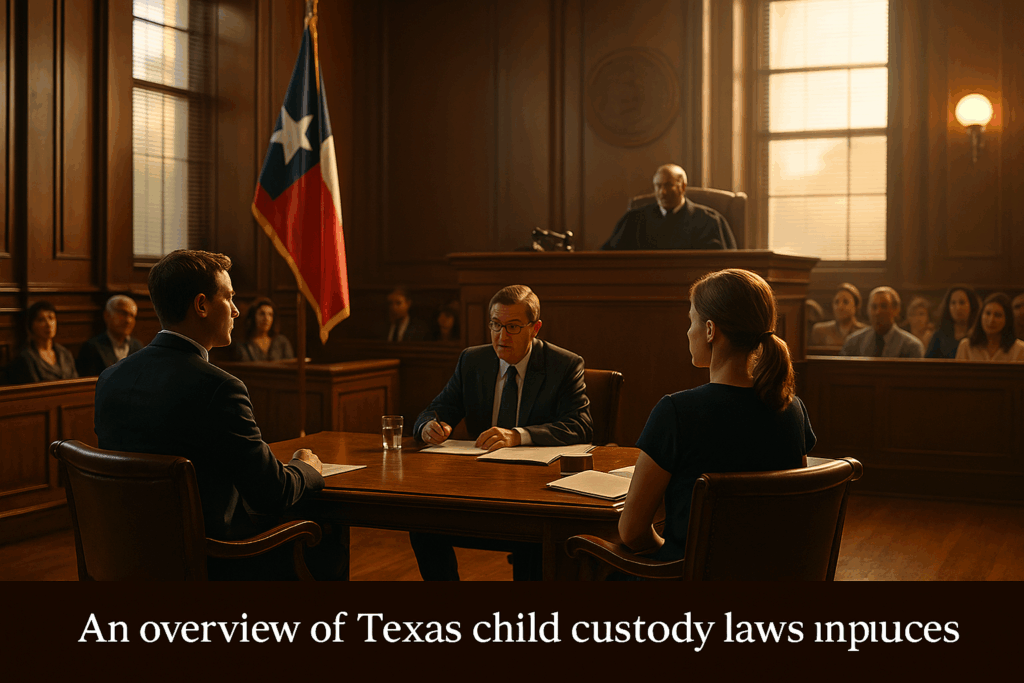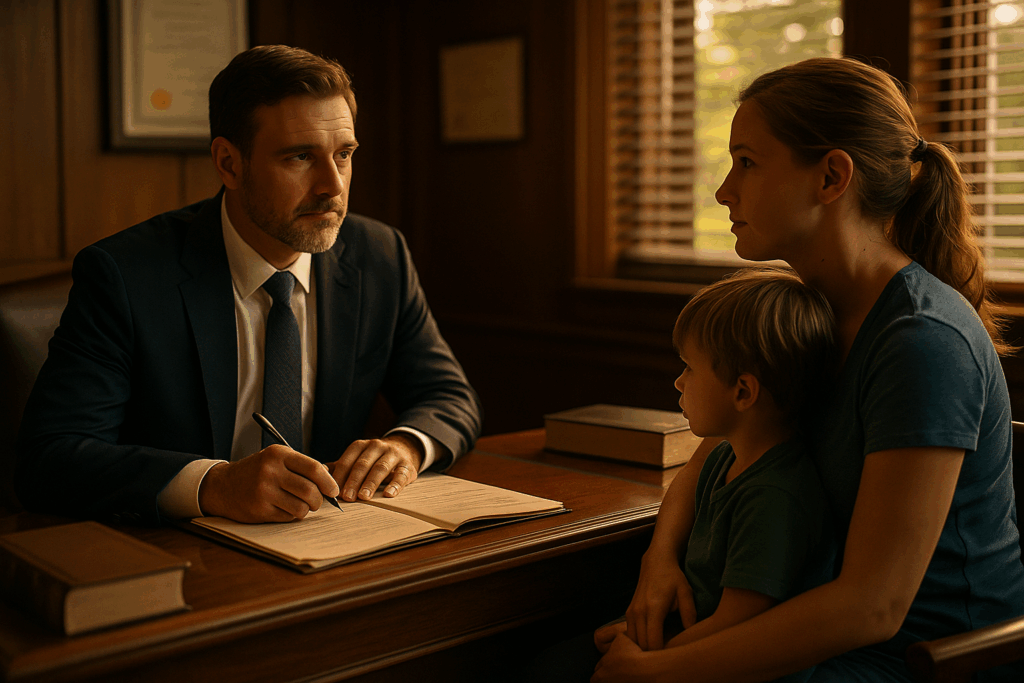
Ever tried figuring out who’s supposed to drop the kids off at soccer practice… only to realize both parents thought it was the other one’s day? Suddenly, your 10-year-old is standing on the curb in cleats and nobody’s there. Moments like this aren’t just scheduling mishaps—they’re signs of deeper confusion in co-parenting. Texas Child Custody Legal Representation isn’t just about custody papers and court dates—it’s about creating structure in your child’s life when everything else feels uncertain.
In this article, we’ll explore how divorce and custody battles can quietly impact kids in ways you might not expect—like declining school performance, emotional stress, or unpredictable routines—and how strong legal guidance can help fix that. We’ll explain how Texas courts consider academic stability in custody cases, what kind of parenting plans actually work in real life, and how the right support can protect your child’s routine—and their future.
You’ll walk away with tips you can use today (yes, even before the next soccer practice), legal insights most parents don’t know, and a better understanding of how The Law Office of Bryan Fagan, PLLC helps Texas families turn chaos into clarity. If you’re navigating custody and want to do what’s best for your child—legally, emotionally, and practically—you’re in the right place.
Key Takeaways
- Texas child custody arrangements, known as conservatorships, can be joint or sole, each carrying different rights and responsibilities for parents.
- The legal process for custody cases in Texas involves filing a Suit Affecting the Parent-Child Relationship, mediation, and potentially court hearings, all prioritizing the child’s best interests.
- Quality legal representation enhances the likelihood of favorable custody outcomes, making it essential for parents to work with experienced attorneys who can navigate complex legal landscapes and provide emotional support.
Understanding Texas Child Custody Laws
Understanding child custody in Texas requires more than just knowing your parental rights—it requires a working knowledge of the legal framework designed to protect children’s well-being. As our attorneys frequently advise, the foundation of every custody case lies in three essential components: conservatorship, possession and access, and the best interest of the child standard, detailed in Texas Family Code Section 153.002. These principles ensure that decisions around parenting responsibilities and schedules always prioritize the child’s emotional and physical needs.
In Texas, custody is legally referred to as conservatorship. Parents may be named joint managing conservators, meaning they share decision-making responsibilities, or one parent may be appointed a sole managing conservator when circumstances warrant it—such as in cases involving neglect, substance abuse, or prolonged conflict, as outlined in Section 153.131 of the Texas Family Code. According to our family law team, courts are increasingly focused on promoting stability while encouraging cooperative parenting where possible.
When parents can’t agree on a schedule, Texas courts use a Standard Possession Order (SPO) as a guideline under Section 153.311. This default schedule aims to give both parents meaningful time with the child while reducing conflict. However, courts may tailor the plan based on specific needs, especially for young children or families with complex logistics. As we’ve seen in our work with Texas families, thoughtfully structured possession schedules often lead to stronger co-parenting relationships and fewer post-divorce disputes.
If you’re preparing for a custody case and want to better understand your options, we encourage you to explore our child custody attorney services for in-depth guidance. While Texas Child Custody Legal Representation is at the heart of what we do, our firm goes beyond paperwork and courtrooms—we help parents build lasting stability for their children. You can also learn more about how judges evaluate custody decisions to better prepare for what lies ahead.
Legal Tip:
Feeling overwhelmed about filing for divorce in Texas? You’re not alone—and you’re not without options. A trusted Texas Divorce Attorney can help you approach the process with clarity, strategy, and peace of mind.
At The Law Office of Bryan Fagan, PLLC, our experienced team guides clients through every step of mediation, from early preparation to final agreement. Whether you’re seeking a more peaceful alternative to courtroom battles or simply want to stay in control of your outcome, we’re here to support you legally and emotionally. Learn how mediation can streamline your divorce in our resource: Understanding Divorce Mediation Process: What to Expect.

Conservatorship in Texas
Texas family law refers to child custody arrangements as conservatorships. This term covers the rights and duties of parents regarding their child’s care and upbringing. Conservatorship can be joint or sole, each carrying different implications for the parent-child relationship and families.
Joint managing conservatorship enables both parents to share responsibilities for significant decisions about the child’s upbringing, including education, schooling, healthcare, and religious training. This arrangement ensures both parents have equal rights to participate in their child’s life, similar to joint custody.
Sole managing conservatorship, however, grants one person parent exclusive rights and responsibilities, including determining the child’s primary residence. This type is often awarded when one parent is deemed unfit or unable to participate in joint decision-making.
Possession and Access Schedules
Possession and access schedules detail the time each parent spends with their child. When parents cannot agree on a visitation schedule, Texas law offers a Standard Possession Order as a guideline, outlining a default visitation arrangement to ensure the non-custodial parent has regular access to their child.
The Standard Possession Order serves as a starting point, but parents can modify it to suit their family’s needs. These schedules aim to maintain a balanced relationship between the child and both parents, fostering a stable and supportive environment.
If the child’s safety is a concern, the court may impose a more limited visitation schedule to protect the child’s welfare and intervene if necessary, potentially establishing a visitation order to enforce the terms.
Best Interest of the Child Standard
The best interest of the child is the cornerstone of all custody decisions in Texas, ensuring that every court decision prioritizes the child’s welfare and overall well-being. Texas courts consider various factors to determine what arrangement best serves the child’s interests.
Judges evaluate evidence related to the child’s safety, including any history of abuse or neglect, and assess the parents’ willingness to cooperate and co-parent effectively. Courts also strive to maintain a healthy relationship between the child and both mothers and parents, recognizing the importance of each parent’s role.
Ultimately, Texas law is designed to support the child’s best interests in every custody decision.
The Legal Process for Child Custody Cases in Texas
Navigating a Texas child custody case begins with a structured legal process that, while complex, can be managed with the right support. As our attorneys frequently advise, the first formal step is filing a Suit Affecting the Parent-Child Relationship (SAPCR), governed by Texas Family Code Chapter 102. This filing outlines the petitioner’s requests regarding conservatorship, possession and access, and support. A carefully drafted SAPCR sets the tone for the rest of the case and helps protect both parental rights and the child’s stability from the start.
Once a SAPCR is filed, Texas courts generally encourage parents to attempt mediation before moving toward trial. Under Texas Family Code Section 153.0071, mediation gives families a chance to resolve disagreements in a less adversarial environment. When successful, these agreements are legally binding and often more personalized than court-issued orders. According to our family law team, mediation not only reduces emotional strain but also often leads to stronger long-term co-parenting outcomes for both parents and children.
If no agreement is reached through mediation, the case will advance to a court hearing. Here, the judge considers a range of factors in accordance with the best interest of the child standard in Section 153.002, including emotional needs, safety, stability, and the ability of each parent to meet those needs. Our legal professionals have helped many clients understand how to present a compelling case and prepare for custody hearings, whether the issue is primary residence, parenting time, or enforcement of prior orders.
To better understand what goes into a successful custody strategy, visit our breakdown of divorce attorney services for Texas families, where we explain how legal guidance can influence outcomes. While Texas Child Custody Legal Representation is a core part of what we provide, our support goes beyond the courtroom—it’s about helping families build a stable future with confidence and clarity. For more insights, explore our article on what to expect in a Texas custody hearing.

Filing a SAPCR
A Suit Affecting the Parent-Child Relationship (SAPCR) establishes rights and duties regarding a child’s care. To initiate this process, individuals must:
- Complete and submit the Original Petition in suits affecting the Parent-Child Relationship to the appropriate court
- Usually file in the county where the child resides
- Ensure the petition meets jurisdictional requirements outlined in the Texas Family Code
Organization is crucial during this process. Essential documentation includes forms detailing requests regarding child custody and visitation. Compiling evidence and preparing documents that support your case can significantly impact your ability to navigate the custody process smoothly.
A detailed timeline of events related to your custody case helps your attorney develop a stronger strategy that ultimately impacts the lives involved.
Mediation and Hearings
Mediation plays a critical role in Texas child custody cases, often serving as a preliminary step before court hearings. During mediation, parents and their attorneys negotiate a mutually acceptable custody agreement, aiming to resolve disputes without a trial. This process can be less adversarial and more collaborative, allowing both parties to focus on the child’s best interests.
If mediation fails, the case proceeds to court hearings. The duration of these hearings varies, depending on whether the case is contested or uncontested. In contested cases:
- A final hearing must be set with at least 45 days’ notice to the other parent.
- During these hearings, the court examines evidence.
- The court adjusts visitation arrangements if necessary.
- Decisions are made based on the child’s welfare.
The Importance of Quality Legal Representation
Child custody disputes are among the most emotionally charged and legally intricate matters in Texas family law. The decisions made during these cases can shape a child’s future in profound ways—from stability and schooling to emotional health and safety. As we’ve seen in our work with Texas families, having quality legal representation isn’t just helpful—it’s essential. With the right attorney guiding you through the complexities of Texas Family Code Chapter 153, you gain the clarity, confidence, and legal strategy needed to protect both your parental rights and your child’s well-being.
The standard for resolving custody issues in Texas centers on the best interest of the child, as defined in Section 153.002. This requires courts to weigh a range of factors, including the child’s emotional and physical needs, each parent’s ability to provide a stable environment, and any history of conflict, neglect, or abuse. A strong legal advocate can help present your case effectively, ensuring these factors are addressed with both clarity and compassion. As our attorneys frequently advise, the outcome of a custody case often depends not just on facts—but on how those facts are organized, communicated, and supported by Texas law.
Our legal professionals have helped many clients understand how to approach even the most high-stakes custody cases with the right blend of preparation and sensitivity. Whether you’re navigating conservatorship rights, crafting a parenting plan, or pursuing modifications to a prior order, your legal team plays a pivotal role in shaping outcomes that serve the child’s needs while respecting your goals as a parent. Learn more about what to expect from your legal team in our detailed guide on the best child custody representation in Texas.
At The Law Office of Bryan Fagan, PLLC, we believe that Texas Child Custody Legal Representation should empower families—not overwhelm them. Our compassionate, experienced attorneys are committed to educating parents, protecting children, and securing fair, workable solutions in every custody matter we handle. For further reading, we also recommend our article on common mistakes to avoid in Texas custody cases, where we outline practical tips for success in and out of court.

Strategic Planning and Emotional Support
Effective child custody attorneys excel in strategic planning and providing emotional support to their clients. Open communication with your attorney facilitates better information exchange and strategy development, ensuring your concerns are addressed and you understand the legal process.
Building a trusting relationship with your attorney is essential for informed decision-making. Open dialogue about case updates and any changes in circumstances can significantly impact your case’s outcome.
With the right support and strategic planning, you can assist with the complexities of child custody with greater confidence and peace of mind. Additionally, seeking assistance can further enhance your understanding of the process.
High-Stakes Situations Requiring Experienced Representation
High-stakes situations in child custody cases, such as emergency custody orders and allegations of abuse, underscore the need for skilled legal representation. Texas family courts require clear and convincing evidence to support allegations, making experienced representation crucial.
Fathers facing false accusations during custody disputes should contact a fathers’ rights attorney to navigate the complexities involved in paternity matters. During contentious custody battles, parents may make false accusations, leading to serious legal repercussions. In such high-stakes situations, having a knowledgeable attorney can make all the difference.
Working with a Texas Child Custody Attorney
Working with a child custody attorney in Texas means building a partnership rooted in preparation, trust, and open communication. As our legal professionals have helped many clients understand, Texas Child Custody Legal Representation is most effective when it’s supported by strong collaboration between client and counsel. According to Texas Family Code Section 153.134, parenting plans must clearly define rights, duties, and schedules in a way that prioritizes the child’s best interest. By staying transparent and proactive, you give your attorney the tools to advocate strategically and confidently on your behalf.
Effective communication is key at every stage of a custody case—from the first consultation to final orders. Keeping your attorney informed about changes in living arrangements, school issues, or parental cooperation allows us to adapt your case plan in real time. As we’ve seen in our work with Texas families, even small updates can impact major decisions in court. Organized documentation of school records, co-parenting communications, and past visitation patterns can make a measurable difference in hearings and mediation sessions.
Preparation also plays a central role in helping families avoid unnecessary conflict. Our attorneys often recommend that clients utilize resources like parenting plan templates, communication apps (such as OurFamilyWizard), and custody calendars. These tools not only support smoother daily transitions between households but also help demonstrate your reliability and commitment to co-parenting—key factors considered under Section 153.003, which requires courts not to consider marital status or gender, but rather what serves the child’s welfare.
For more insight into how to prepare for custody success, explore our comprehensive resource on winning strategies for child custody cases. At The Law Office of Bryan Fagan, PLLC, our mission is not only to protect your rights but also to guide you through every detail of the process with care and clarity. You can also review our helpful article on how to prepare for your first meeting with a custody attorney, so you’re confident and ready from day one.

Transparency and Communication
Open communication with your attorney ensures they fully understand your concerns and objectives during the complex process of child custody cases. Establish a regular communication schedule with your attorney to stay updated on case progress and discuss any questions or concerns.
Be proactive in sharing any documentation or information that may impact your case, as this can help your attorney formulate a more effective strategy. Building trust with your attorney enables a more collaborative approach to your case, leading to better outcomes in child custody disputes.
Organization and Preparation
Staying organized and prepared is essential when working with a Texas child custody attorney. Utilize resources like ‘Building a Parenting Agreement That Works’ to create effective parenting plans outlining each parent’s rights and responsibilities. Compiling evidence and preparing documents that support your case can significantly impact your ability to navigate the custody process smoothly.
Creating a detailed timeline of events related to your custody case helps your attorney develop a stronger strategy. Utilizing digital tools to track communication and important documents can streamline preparation for your case.
Spotlight on the Law Office of Bryan Fagan, PLLC
The Law Office of Bryan Fagan, PLLC, is renowned for its expertise and personalized approach to Texas child custody cases. The firm offers comprehensive support and tailors its approach to meet the unique needs of each client and case. With a team of attorneys boasting substantial experience in Texas family law, the firm is well-equipped to navigate complex custody cases.
The firm’s attorneys have extensive backgrounds in Texas family law, enhancing their ability to provide effective legal solutions. By focusing on the child’s best interests and developing individualized legal strategies, the Law Office of Bryan Fagan ensures each client receives personalized representation from a family law attorney.
Legal Tip:
Feeling uncertain about your child custody situation in Texas? You’re not alone—and you’re not without solutions. A trusted Texas Child Custody Attorney can help you approach the process with confidence, clarity, and care for your child’s well-being.
At The Law Office of Bryan Fagan, PLLC, our experienced legal team walks parents through every stage of the custody process—from filing and mediation to court hearings and final orders. Whether you’re pursuing a cooperative parenting plan or preparing for a contested case, our attorneys provide personalized guidance tailored to your family’s needs. Learn how we help families stay informed and empowered in our article: What Does the Court Consider in a Custody Case?

Combined Experience and Expertise
The Law Office of Bryan Fagan boasts a team of attorneys with substantial experience in Texas family law, enhancing their capability to navigate complex custody cases. The firm’s attorneys have extensive backgrounds in Texas family law, enhancing their ability to provide effective legal solutions.
Focused on achieving outcomes that align with the child’s best interests, the firm’s attorneys ensure clients receive the highest level of legal representation through their combined experience and expertise.
Personalized Case Strategies
The Law Office of Bryan Fagan prioritizes personalized legal representation, ensuring tailored strategies for every client. Each case is approached uniquely, ensuring that legal strategies align closely with the client’s specific circumstances and goals.
The firm customizes its legal strategies to align with the specific circumstances and needs of each client involved in child custody disputes. This personalized approach ensures that clients receive the best possible outcomes.
Call to Action: Secure Your Texas Child Custody Legal Representation Today
When navigating the complex and emotionally charged landscape of child custody, having the right legal representation on behalf of your child can make all the difference. The Law Office of Bryan Fagan, PLLC, specializes in representing clients in child custody cases, ensuring tailored legal strategies that prioritize the best interests of your child. Their experienced attorneys are dedicated to guiding you through each step of the process, from filing a SAPCR to mediation and court hearings.
Don’t wait to secure the legal support you need. Contact the Law Office of Bryan Fagan, PLLC, today for a free consultation. Take the first step towards protecting your parental rights and ensuring your child’s welfare by partnering with a team that understands the intricacies of Texas child custody laws and is committed to achieving the best possible outcome for your family.
Legal Tip:
Facing a child custody decision in Texas and not sure where to start? You’re not alone. Scheduling a trusted Child Custody Consultation Texas can provide you with the legal clarity and strategy you need to move forward with confidence.
At The Law Office of Bryan Fagan, PLLC, our family law team offers in-depth consultations that answer your questions, explain your rights, and help you understand what to expect during every phase of the custody process. Whether you’re initiating a case or responding to one, we’ll help you explore your legal options with compassion and experience. Learn more about how an initial consultation can guide your next step in our article: Understanding Texas Child Custody Consultations for Parents.

Conclusion:
Parenting through a divorce is tough—no sugarcoating that. But having a solid custody arrangement that supports your child’s day-to-day life? That can make all the difference. Whether it’s about keeping homework on track, preserving bedtime routines, or simply making sure someone shows up at soccer practice, the choices you make now shape your child’s stability for years to come.
That’s where the right legal guidance matters. When you work with a team that understands both Texas Family Law and real-life parenting, you’re not just fighting for custody—you’re building a foundation for your child to thrive. At The Law Office of Bryan Fagan, PLLC, we take that responsibility seriously. Because for us, it’s not just about courtrooms and codes—it’s about protecting what matters most: your family’s future.
If you’re staring down a custody decision or struggling with the one you have, let’s talk. You don’t have to navigate this alone, and you certainly shouldn’t have to guess your way through it. We’re here to answer questions, listen to your concerns, and help you take the next step with confidence.
And hey—if this all feels overwhelming, take a breath. Then picture your child smiling because they know what to expect each day. That’s what we’re working toward together. Ready when you are.
Texas Child Custody FAQ
What is rule 11 in child custody in Texas?
A Rule 11 Agreement in Texas child custody cases is a written agreement between parties, often involving visitation or conservatorship terms, that is signed by both parties and filed with the court. It is enforceable like a court order and is used to memorialize temporary or informal arrangements without a full court hearing.
Do I need an attorney for child custody in Texas?
While it’s not legally required to have an attorney in a Texas child custody case, hiring one is highly recommended—especially if the case is contested. An experienced attorney can help you protect your rights, navigate complex family law procedures, and advocate for your child’s best interests.
What is the most common child custody arrangement in Texas?
The most common custody arrangement in Texas is joint managing conservatorship, where both parents share rights and responsibilities for the child. Typically, one parent is granted the exclusive right to determine the child’s primary residence, while both parents share decision-making powers.
Can I get a court-appointed attorney for child custody in Texas?
Generally, court-appointed attorneys are only provided in child custody cases involving the Texas Department of Family and Protective Services (CPS). In private custody disputes, parents are typically responsible for hiring their own legal representation.
What is the 2 2 3 custody schedule in Texas?
The 2-2-3 custody schedule is a shared parenting plan where one parent has the child for 2 days, the other for the next 2 days, and then the first parent has the child for 3 days. The pattern then reverses the following week. This schedule aims to give both parents frequent, consistent time with the child.
What makes a parent unfit for custody in Texas?
A parent may be deemed unfit in Texas if they engage in abuse, neglect, substance abuse, criminal activity, or otherwise demonstrate behavior that endangers the child’s physical or emotional well-being. Courts prioritize the child’s best interests when evaluating parental fitness.
Does it matter who files for custody first in Texas?
Filing first for custody in Texas does not guarantee a better outcome, but it can provide some procedural advantages, such as selecting the jurisdiction and setting the pace for the case. Ultimately, the court’s decision is based on the child’s best interests, not filing order.
How can a father lose custody in Texas?
A father can lose custody in Texas if he is found to be unfit, such as engaging in abuse, neglect, substance use, or failing to maintain a stable environment for the child. The court evaluates each parent’s ability to care for the child and prioritize their best interests.
At what age can a child refuse to see a parent in Texas?
In Texas, children 12 years and older may express a preference about which parent they wish to live with, but they cannot legally refuse visitation. The court considers the child’s preference as one factor in determining custody but still makes the final decision based on the child’s best interests.




